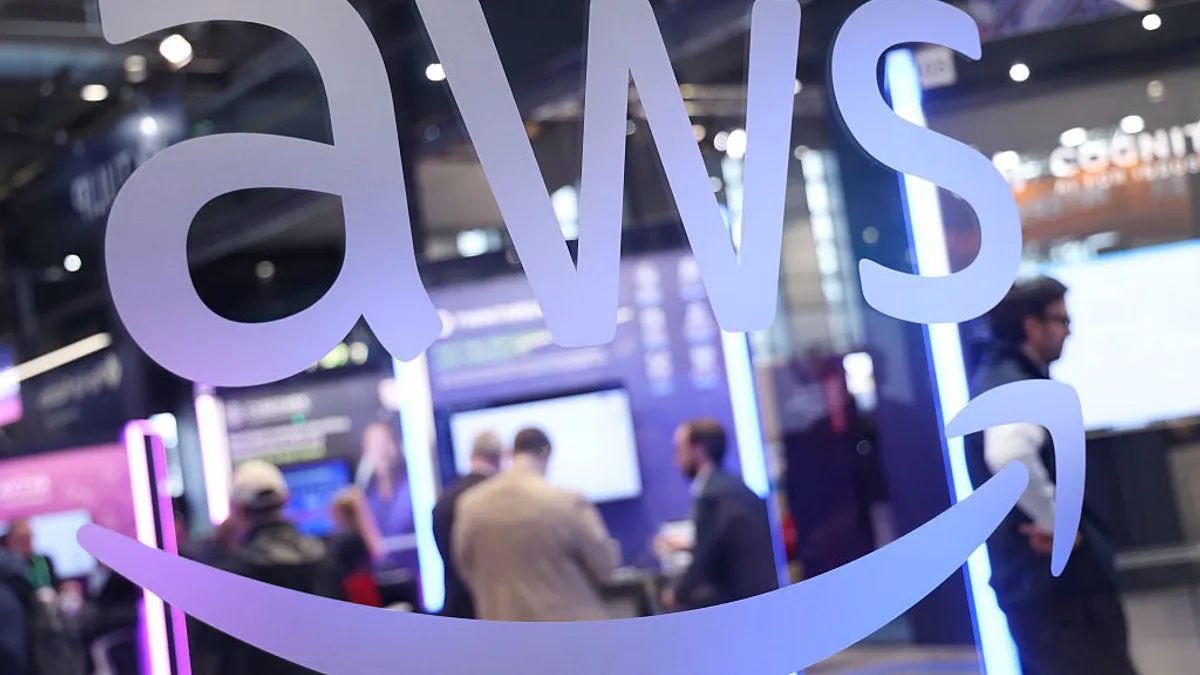Until this week, no cloud provider allowed customers to use artificial intelligence offerings on a competitor's cloud. Once only available on IBM Cloud, Watson can now be accessed on any public, private or hybrid cloud environment.
The future of cloud is rarely discussed without mention of multicloud use.
The "decision to bring some Watson services to other cloud environments shows that IBM sees its future providing services across different cloud environments, not just its own," said Blair Hanley Frank, principal analyst at ISG, in an email to CIO Dive.
IBM's move could set the table for other cloud providers to follow, but currently there are no other participants in this race. Essentially, customers will be forced to evaluate the benefits of using Watson if they're an Amazon Web Services customer already using its AI functions like Rekognition and Polly.
The multicloud environment is a driver of efficiency, allows companies to avoid vendor lock-in and reduces IT spending. This trend paved the way for Watson's reach outside of IBM's cloud, even though it's built on the IBM Cloud Private for Data which requires buying into the platform, said Frank.
Cloud providers already have services that reach beyond their platform, especially in the communication market, noted Frank. "Many of those services have at least some degree of multicloud availability;" this may be the new frontier.
It's all up in the clouds
Watson's cross-cloud availability begs the question, was this a real pain in the cloud market to begin with?
"I think there are smart people at Amazon Web Services, Microsoft Azure and Google that would've figured this out if there was really a need for it," said Sid Nag, senior director analyst at Gartner, in an interview with CIO Dive.
The market's potential expansion will be "driven by how much interaction it gets in the market and what workloads will be leveraging something like this," said Nag. Until vendors like Microsoft and Google start rolling out their own versions of a cross-cloud Watson, that question will go unanswered, though there are AI scalability concerns that need addressing.
The "decision to bring some Watson services to other cloud environments shows that IBM sees its future providing services across different cloud environments, not just its own."

Blair Hanley Frank
Principal analyst at ISG
Watson is a strong force in IBM's portfolio because it's not a single artificial intelligence, said Frank.
Watson is a home for "many things that IBM has placed under the same brand umbrella" and has reputable brand recognition, said Frank. That recognition will likely make the push for further enterprise adoption easier for IBM because Watson has strong sales liaisons between enterprise customers and IBM.
There isn't a one-size-fits-all approach to AI, so service providers have made their own offerings, "which is one of the easiest ways for enterprises to adopt those capabilities today," said Frank.
The ability for Watson to transcend clouds speaks to the rise in startups offering "off-the-shelf" AI solutions with APIs for integrations and the need for platforms to "streamline the training and operation of AI models in an enterprise context," said Frank.
Workloads requiring Watson
Instead of mastering the cloud market at large, which IBM has been unable to do, it is honing in on one very important part: AI capabilities.
Companies will have to ask, which workloads would require something like Watson, where it's a single layer of AI functions running in multiple clouds, said Nag.
The move illustrates IBM's willingness to "meet the customer anywhere," which is most likely on another cloud, said Nag. IBM was never quite able to break out of the niche cloud category on Gartner's Magic Quadrant. Watson is making Big Blue's presence known on all other major cloud players.
Cloud compute infrastructure as a service encases computing resources with storage and networking abilities "owned by a service provider and offered to a customer on demand," according to Gartner.
IBM has seen hiccups in the cloud IaaS space, which have resulted in incidents that "negatively impacted its time to market," according to Gartner. But those dilemmas have led Big Blue to further high-value segments of the tech industry, including AI.
"I think there are smart people at Amazon Web Services, Microsoft Azure and Google that would've figured this out if there was really a need for it."

Sid Nag
Gartner senior director analyst
Introducing Watson to competitors' cloud environments is IBM's way of saying "we don't want to compete with the Amazons and the Googles or the Azures of the world," according Nag.
While IBM has shown no indication that it's taking a step back from the cloud market, this is just the company's way of saying, "let's not compete in that market in that way," said Nag. "We're going to continue to drive adoption of those offerings but that's not going to be our main push."
Big Blue's longevity sits in specialized technologies. "One of the greatest things you learn in a transformation is what you are and what you aren't," said CEO Ginny Rometty, while speaking at Gartner Symposium/ITxpo in October.
AI helped redirect IBM's innovation pipeline after sitting six years in a revenue rut. IBM's pioneering technologies, from hard drives and quantum computing to the world's tiniest computer, cemented its legacy.
The Watson cloud news allows IBM to let its competitors fight the cloud battle while it's "going to elevate the conversation" and pursue solutions faster than other tech companies, said Nag.




















